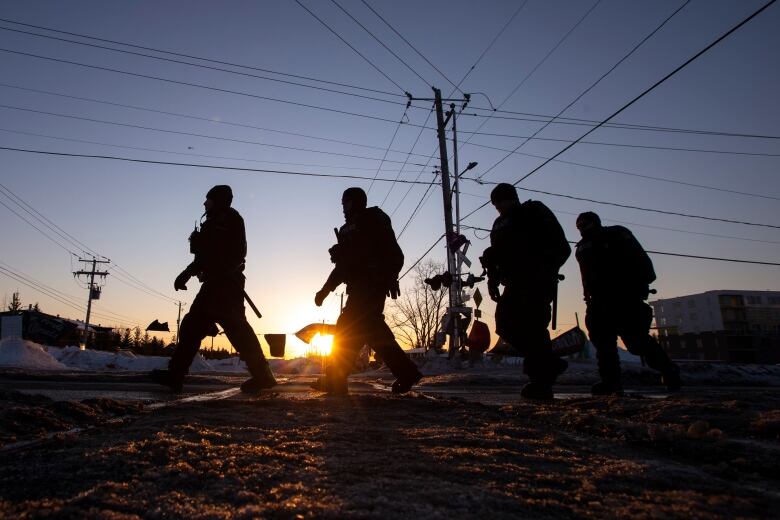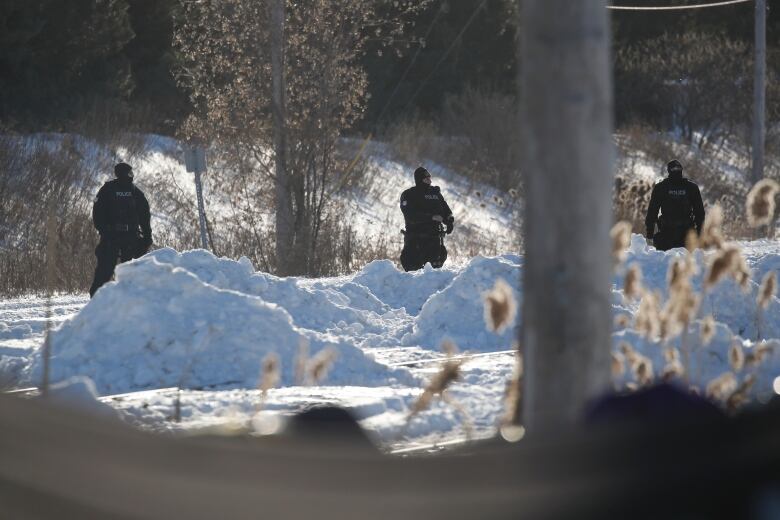Protesters peacefully abandon blockade on Montreal's South Shore
Protesters were served an injunction Thursday but police did not physically force them to leave

After giving a short speech to reporters Friday night, masked protesters who have been blocking a CN Rail line in Saint-Lambert on Montreal's South Shore abandoned their blockade.
It was tense throughout the day as counter-demonstrators and police negotiators tried to convince the protest group to leave. They had been blocking the busy Mont-Saint-Hilaire commuter line since Wednesday.
The protesters were servedan injunction Thursday evening, but many held their ground throughout the night, building snow forts, huddling around a barrel fireand sleeping in tents.
Finally, Longueuil police officers, clad in black riot gear and wearing ski masks, stood information around the remaining protesters Friday evening.
Officers gave the protesters until 5 p.m. to leave, but nothing physical happened andriot police eventually left the scene despite Quebec Premier Franois Legault'spromise to "dismantle the blockade" once the injunction was served.
Protesters are trying to fortify the Saint-Lambert blockade. A counter protester is trying to stop them. So far its peaceful, if tense. pic.twitter.com/30wIVpNx6w
—@katemckenna8By Friday evening,roughly two dozen protesters remained on sitein a show of solidarity for Wet'suwet'en hereditary chiefs in BC, who are against a pipeline passing through traditional territory.
Unlike most other railblockades across the country, the one in Saint-Lambert was not on Indigenous territory.
Before leaving at around 10 p.m., unidentified protesters expressed their support for the hereditary chiefs, criticized colonialism and called for action.
They then hefted their colourful array of plastic shovels onto their shoulders and walked off into the night.
Riot police moved into their place, forming a line across the road and watching the protesters leave.

On Saturday morning, Exo said in a statement that there will be no service along theMont-Saint-Hilaire commuter line over the weekend, since the tracks need to be inspected and safety tests need to be run.
The company said barring another event beyond its control, the line will be operational again as of Monday morning at 5:45 a.m.
'We're trying to be pacifists'
Saint-Lambert resident Henri-Franois Girardtold CBCNews he decided to join the protesters because he supports their cause.
"I was just passing by and I saw 'Hey, these guys are doing the right thing,'" he said.
He feels their protest has been portrayed negatively in the media, but in person, "they're all good people over there in the camp."
Girard said he was moved to join them because he feels the climate crisis is an issue that can't be ignored. He hopes the stand-off between protesters and police won't lead to violence.
"We're trying to be pacifists, we're not trying to cause trouble," he said.
The Mont-Saint-Hilairelineis the second commuter train route to be disrupted in the greater Montreal region.
A blockade in Kahnawake, also on Montreal's South Shore, has forced Exo to cancel travel on its Candiac line since Feb. 10.
Legault said the Kahnawake blockade will not be dismantled by the Quebec government, because it is on Mohawk territory.
Many of the protesters in Saint-Lambert wereyoung people and students, the majority of which are not Indigenous.

A special case in Saint-Lambert
Saint-Lambert Mayor Pierre Brodeuremphasized this distinction in an interview with Radio-Canada's Tout Un MatinFriday morning.
He said that "it's frustrating to watch a small group of people who are depriving the citizens of Longueuil of access to commuter trains," adding that the protest isn't taking place on Indigenous land, nor is it led by Indigenous people.
"These are people who have nothing to do with Indigenous people," he said.

In his view, the protest happening in Saint-Lambert is "completely different" from those taking place in other parts of the region.
Brodeursaid it's not fair that commuters in his area should be impacted by the solidarity protest, saying "we are just waiting for the green light" and that he is "impatient to get started dismantling these barricades."
Ghislain Picard, chief of the Assembly of First Nations of Quebec and Labrador, told CBC Montreal's Daybreak that "this is so much bigger than an issue of land rights out in BC. It affects everyone," he said.
Picard said if police remove Saint-Lambert protesters by force, it might mobilize more groups of people to take action in solidarity.
"People are talking and trying to find ways to be supportive," he said.
He said this crisis provides an opportunity for Prime Minister Justin Trudeau to prove his commitment to building relationships with Indigenous people in Canada and resolving the conflict peacefully will be a key part of that.
On Friday, Trudeau said the blockades "need to come down now," but said he would not be sending in the army to do so.
With files from CBC's Elias Abboud, Radio-Canada












_(720p).jpg)


 OFFICIAL HD MUSIC VIDEO.jpg)
.jpg)



























































































